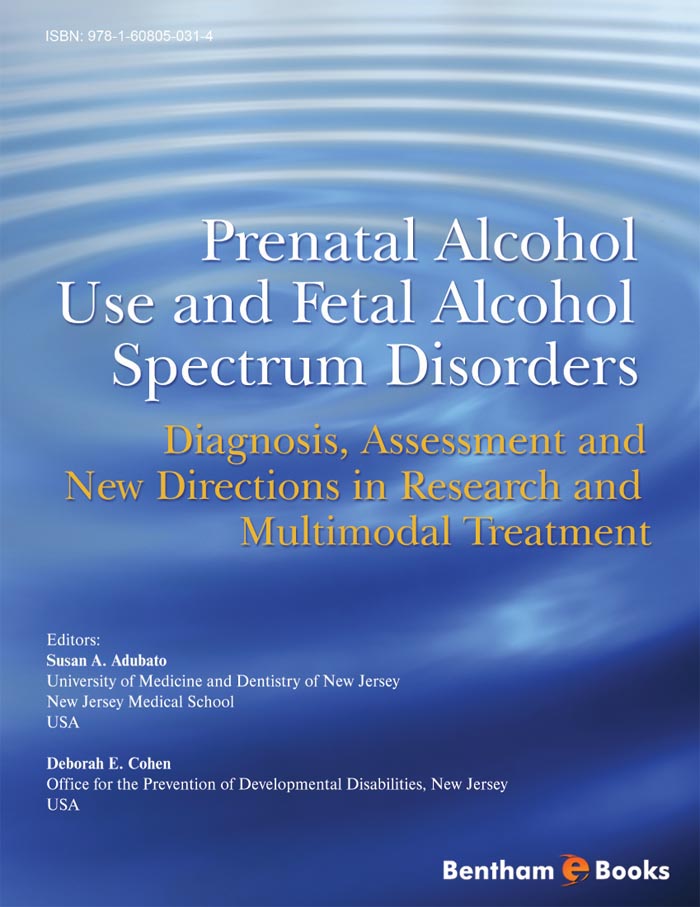Welcome to the first ebook on prenatal alcohol exposure and Fetal Alcohol Spectrum Disorders (FASD). When we first set out to do this E book, our intent was to compile a text that presented a past, present, and future directions perspective, but our authors had their own ideas. This book has turned out to be a look, not only at present research but, more importantly, innovations of research and clinical interventions. In addition, while the thematic basis for this ebook is the consequences of consuming alcohol during pregnancy, each chapter offers a different perspective resulting from prenatal exposures. As such, each chapter can "stand alone". This ebook provides a phenomenal opportunity in that it allows readers to "link" directly to relevant websites, and to view real time videos within the text.
Although the use of the term "FASD" was not officially accepted for general use until 2004, many clinicians in the field used it previously. Please note that many of the authors for this ebook use FASD generically for their discussions regarding any prenatal alcohol exposure, even when discussing issues prior to 2004. In addition, the term "intellectual disability" has replaced the term "mental retardation".
Our first chapter begins with an oft-times debatable topic- diagnosis. Susan Astley provides a provocative chapter on such a heated topic. Presenting the various models in use today, Dr. Astley provides the reader with the choices for diagnosing an FASD and the strengths and weaknesses of each model.
The second chapter, by Jennifer Thomas and Ed Riley, presents the fascinating and relatively new research on choline and other interventions. Drawn from basic science research, the interventions discussed seem to hold some promises for improving the effects of prenatal exposure to alcohol in the coming years.
The chapter by Natalie Novick Brown, Kieran O'Malley and Anne Streissguth addresses the challenges of diagnosing, assessing and treating psychiatric problems that are associated with prenatal alcohol exposure and co-occurring issues. Chapters 4-6 provide a life span look at the difficulties encountered by families dealing with prenatal alcohol exposure, and some of the innovative work being done for and with our families. Heather Carmichael Olson and Rachel Montaque, begin this journey with a chapter that addresses the importance of early interventions and other related issues for young children. Claire Coles, Elles Taddeo and Molly Millians discuss very interesting and innovative interventions that are assisting school aged children to reach their potential. And finally, Mary DeJoseph completes the life span approach in her discussion of the continuing needs of adolescents and adults that are exacerbated by the paucity of scientific research for, and what some of the clinicians in the field have been suggesting, are effective intervention.
Kay Kelly provides very practical approaches for navigating the sometimes difficult and confusing social and legal systems in Chapter 7.
The next chapter by Kathy Mitchell and Mary DeJoseph allows the reader to understand what it means to struggle with addiction, recovery and an FASD on a daily basis through interviews with and individual vignettes written by family members whose lives have been touched by FASD. Very little of this chapter was edited, so readers will get a firsthand account from the individuals themselves.
For the final chapter, the co-editors, Debbie Cohen and Susan Adubato present the "state of the states": descriptions of federal programs as well as initiatives that have been undertaken in four States and Puerto Rico are presented. This chapter illustrates differing ways state programs have evolved to address the need for screening for prenatal alcohol consumption, FASD assessment, diagnosis and treatment, and service system enhancement. The chapter concludes with information about the role of and need for joining forces with voluntary agencies to address FASD.
The last word for the ebook is a personal journey for one family and offers hope for families that their family member affected by prenatal exposure to alcohol can develop, mature, find love and success and be happy.
Please remember: The opinions expressed in this e book are those of the individual authors, and do not necessarily reflect the views of the editors.
All proceeds for this ebook will go to further training through NOFASNJ.
We would like to thank Cara Castiglio, who works for the Southern New Jersey Prenatal Cooperative for our cover art. We also are most appreciative to Ellen Dunn, NJ Office for the Prevention of Developmental Disabilities, for her careful review of this manuscript.
The editors also would like to thank Bentham Publishers for taking a chance on this ebook, and an extra "thank you" to Bushra Siddiqui, whose patience and direction made the journey much easier.
While we both work in the field of FASD, one of the greatest benefits for us in compiling this ebook is that our knowledge of the consequences of prenatal exposure to alcohol and the possibilities of interventions and treatment grew. It is our hope that you will benefit from this ebook in similar ways and that it stimulates your interest to continue to learn more about FASD. To this end, as this book is to be produced, one new publication has been released on basic research in FASD: [Alcohol, 2011:45(1):1-104] and two recently published are: Looking at legal and justice issues for individuals with FASD [Journal of Psychiatry & Law, 2010;38(4);Winter], and Alcohol Research and [2011,34(1);summer]. Both discuss various topics and new innovations in FASD, including new developments in imaging.
Susan A. Adubato
University of Medicine and Dentistry of
New Jersey New Jersey Medical School
USA
&
Deborah E. Cohen
Office for the Prevention of Developmental Disabilities, New Jersey
USA

